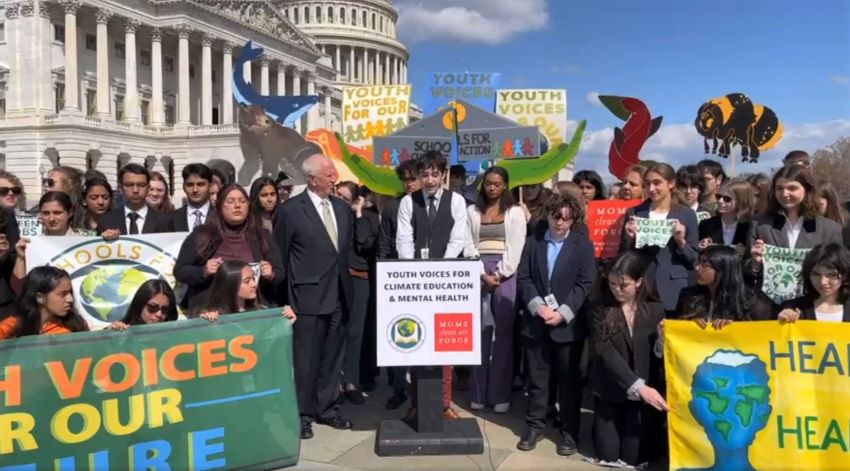
Teens Create Climate Legislation
Because they are too young to vote, many high school students feel locked out of the political process. But voting is not the only way to have a political impact. In fact, youth can be directly involved in the political process and can help develop policy at every level of government. On March 28, more than 60 high school students from 12 states gathered in Washington, D.C. They were there to present bills for universal comprehensive climate education and mental health support for youth impacted by climate change. Supportive elected officials introduced the bills written by the high school students to Congress. A national network has grown up to help teens learn how to write climate policy and become effective advocates for climate action.
Dozens of teenagers converging on Capitol Hill holding signs and banners with slogans like “We Want Green Jobs” makes for an attractive media event. But drawing press was only part of the goal of student speeches referencing the recent UN-IPCC report underscoring climate change as one of the most pressing issues facing our planet.
Climate Education Bills
The students were gathered in Washington, D.C., to present bills for universal comprehensive climate education and mental health support for youth impacted by climate change. Rep. Barbara Lee (D, Ca) introduced education bill H.Res.262 to the House, where it was referred to the Committee on Education and Workforce. The bill supports the integration of interdisciplinary, solution-based climate education curricula into K-12 schools in all states and Washington, D.C. If passed, it would require funding for the implementation of climate education curricula. It would also create an Office of Climate Literacy and Career Development and a Climate Education Task Force in the Department of Education.
Rep. Mike Thompson (D, Ca) introduced the youth mental health bill H.Res.259, which has been referred to the Committee on Energy and Commerce. It is the first piece of legislation utilizing the research on youth climate anxiety and the disproportionate impact of climate mental health issues on BIPOC youth. This bill calls for action on climate change and education, with specific support for the expansion of funding for climate-related projects that benefit the mental health and well-being of youth.
 You can watch the video of the Youth Voices for Climate Education & Mental Health event on Facebook.
You can watch the video of the Youth Voices for Climate Education & Mental Health event on Facebook.
So far, neither committee has taken any action on these bills. Both teens and adults can write their representatives in Congress, as well as members of the relevant committees, to support this legislation. (There’s a template to make it easy.) Youth can also support the two bills by joining virtual meetings with members of Congress.
Schools for Climate Action Network
The bills and their associated press conference were the result of a collaboration between two organizations: Moms Clean Air Force and Schools for Climate Action. Moms Clean Air Force is a community of parents working to eliminate air pollution. Recognizing that carbon is also a pollutant, their work includes climate action.
Schools for Climate Action is a non-partisan, grassroots, youth-focused campaign to empower school communities to advocate for elected officials to combat the climate crisis. They provide free online resources to help teachers introduce climate education and environmental justice in their classrooms. Their web page includes step-by-step instructions that anyone in the school community can use to guide a campaign to pass a school board climate action resolution. And they provide resources that teachers, parents, and students can use to lobby their school boards and other educational organizations to take action on a variety of climate-related issues.

Smoke resilience is particularly relevant to the organization’s home state of California, but it is increasingly important in other states, too. Once a summer issue, peak wildfire season now coincides with back-to-school season. The smoke resilience campaign calls on school districts to pursue funding and support resiliency measures such as infrastructure improvements and climate readiness planning.
The materials provided for the #ElectrifyEverything campaign are meant to enable students and supportive adults to guide their school board to support district-wide electrification. Recognizing the need for clean school buses, they provided links to pursue zero-emission and low-emission school bus rebates during the open funding period last year.
Besides working with their local school board, youth can support Climate Action Network campaigns through social media or by submitting climate-related artwork. Whether they work within the network or on their own, #YouthCanWriteClimatePolicy.
Services Marketplace – Listings, Bookings & Reviews